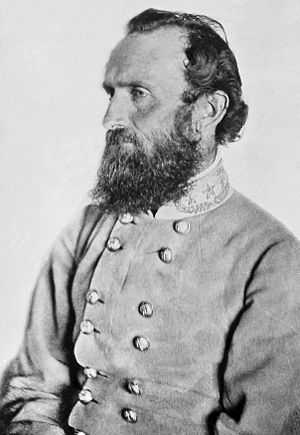 |
| Jackson |
Jackson received word on May 30th of the movements being made against him, but he did not retreat in disorder. He made sure all the prisoners and supplies he had captured were gotten to safety. He was even thinking of moving on the offensive. He sent his friend, colonel Alexander Boteler, a member of the Confederate Congress in Richmond, telling him:
"McDowell and Fremont are probably aiming to effect a junction at Strasburg, so as to cut us off from the upper Valley, and are both nearer to it than we are. Consequently, no time is to be lost. You can say to them in Richmond that I'll send on the prisoners, secure most if not all of the captured property, and with God's blessing will be able to baffle the enemy's plans here with my present force, but that it will have to be increased as soon thereafter as possible. You may tell them, too, that if my command can be gotten up to 40,000 men a movement may be made ... which will soon raise the siege of Richmond and transfer this campaign from the banks of the Potomac to those of the Susquehanna."None the less, Jackson needed to avoid being destroyed, so he began pulling back. However, a disaster struck. He received news that the 12th Georgia, one of his best regiments which had been left to guard supplies at Front Royal, had been surprised and driven back. He continued to move his troops south up the valley as quickly as possible. Fremont and McDowell were very close by. But when they were only a few miles from Jackson they stopped pressing to close the trap. Jackson was allowed to move by while they sat idle. After the inept Northern commanders allowed Jackson to slip by they finally resumed the pursuit. They had a long hard march after Stonewall Jackson. One of Bank's staff officers put it this way:
"From what I can learn here, Jackson is gone beyond pursuit. Thus culminates this disgraceful affair, the most disgraceful to the Federal armies that has occurred during the whole war. I am utterly humiliated to have been mixed up in it."As Jackson was retreating, his cavalry rearguard under Turner Ashby skirmished with the Union forces. In one of these small fights, 150 years ago today, Ashby was killed on Chesnut Ridge near Harrisonburg, Virginia. He was shot at the head of his men, who pushed on beyond their fallen leader and won the skirmish. Ashby, who was known as the Black Knight of the Confederacy, was very good in combat, although his men's discipline off the field was not ideal. "As a partisan officer I never knew his superior;" Jackson said, "his daring was proverbial; his powers of endurance almost incredible; his tone of character heroic, and his sagacity almost intuitive in divining the purposes and movements of the enemy."
 |
| Turner Ashby |
Jackson did not just rejoice that he had avoided destruction, he looked for a way to turn back and strike at his pursuers. Studying the maps that Jedediah Hotchkiss had made for him, he determined that he would halt at Port Republic, where the North and South Rivers combined to form the South Fork of the Shenandoah River. If he burnt the few bridges across the rain swollen rivers he could prevent the Federal forces from combining on him, and instead he could defeat them in detail. That is just what he planned to do.



0 comments:
Post a Comment